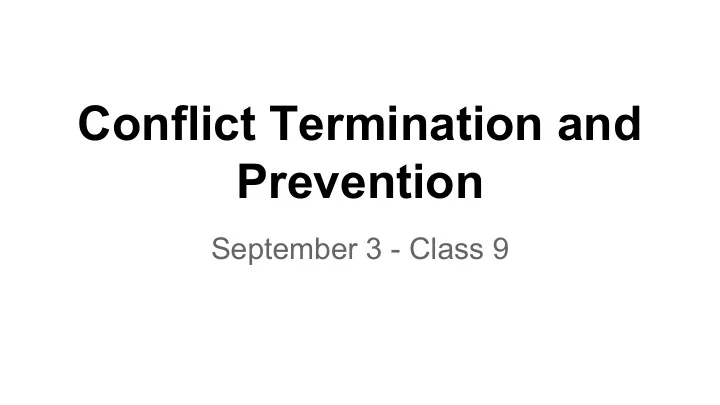

Conflict Termination and Prevention September 3 - Class 9
Conflict Termination ● Over half of all conflicts end in military victory for one side. ● Those that are not require other means of settlement.
Negotiated Settlements ● Both sides must overcome the challenge of commitment problems to settle for peace.
Solving commitment problems?
Solving commitment problems? ● Walter: No insurance against cooperation after war ends. ● Third-party guarantor required to ensure that both sides abide to the agreement and to prevent cheating.
Walter’s test DV? IV? What test does she use?
Spoilers can derail agreements ● Spoilers are actors in civil conflicts that can upend negotiations and ensure conflict continues. ● Ex: Hamas in the 1990s, IRA splinters in 1998.
Stedman: Three types of spoilers Limited spoilers -- want specific grievances addressed before agreement is signed. Ex: RPF in Rwanda in 1993.
Greedy Spoilers Upend agreements to get a better deal. Solution: threaten to end negotiations altogether. Ex: RENAMO in Mozambique in 1992.
Total Spoilers Radicals. Don’t want negotiations. All or nothing. Solution: Coercion or elimination. Ex. UNITA in Angola 1992
Potential Problems with Peace Settlements
Potential Problems with Peace Settlements ● Used by one conflict actor to gain advantage over another. ○ Ex. Tajikistan, Angola. ● Spoilers could be mischaracterized, either excluding or including them.
How to prevent conflict? ● Peacekeepers ● Power Sharing ● Power Division
Peacekeeping (Fortna) ● Can ensure compliance or end ongoing conflicts. Why does peacekeeping appear ineffective? Why does peacekeeping work?
Power Sharing ● Can stabilize post-conflict environment. ● Proportional distribution of: ○ Legislative seats. ○ Administrative appointments ○ Armed forces membership ○ Territorial Autonomy ● Exs: Bosnia, El Salvador.
Power Dividing ● Previous conflict antagonists are delegated veto roles in government: ○ Rotating presidency. ○ Judiciary or ombudsman delegated to minority group. ○ PM must be from certain group. ● Ex: Lebanon: ○ President is Christian, PM is Sunni, Speaker of Parliament is Shia.
Problems with conflict prevention?
Problems with conflict prevention? ● Peacekeepers have limited ability to stop conflict recurrence. ○ Ex: Rwanda. ● Power sharing can be subverted by majority. ○ Ex: Tajikistan. ● Power dividing can create deadlock. ○ Ex: Lebanon.
Discussion What is the most effective method of conflict prevention? Can future conflicts be prevented?
Northern Ireland - Good Friday Agreement Final Case
Background ● Conflict in stalemate throughout 1980s and 1990s. ● IRA conducts bombing campaign of England in early 1990s. ● Tony Blair seeks talks.
Good Friday Agreement ● Agreed to by UK, Ireland, Sinn Fein and DUP. ● Ends hostilities. Creates consociational system: both Unionists and Republicans must be in government. ● Equality of citizenship. Devolution of power for UK. ● Police reform. Prisoner release.
Overcoming Challenges What were challenges to peace? How were the challenges overcome? What are some lingering problems?
Is the Good Friday Agreement a good model? Is it applicable to other cases (i.e. Syria)? What are some potential issues with cross- country application?
Recommend
More recommend